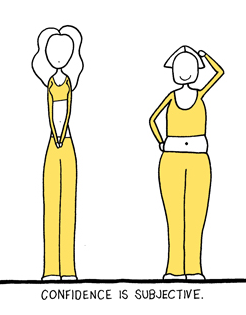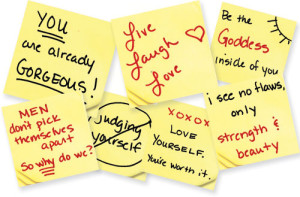Many women (including me) fall victim to “fat talk”. Not many days go by without hearing a friend talk about “having a fat day” or “feeling so fat in these ________ (enter garments here).” Marcia recently posted about her daughter who is almost 12 years saying that she “looks like a whale” in her ice skating dress. (She looked adorable for the record.)
Greatist just had a terrific post on this that cited a study from Notre Dame led by Alexandra Corning, research associate professor of psychology and director of Notre Dame’s Body Image and Eating Disorder Lab, the study was presented recently at the Midwestern Psychological Association annual conference. In the study, college-age women looked at photos of thin and overweight women next to phrases representing either fat talk (“I can pick out something about every part of my body that I’d like to change”) or positive body talk (“I know I’m not perfect, but I love the way I look”). The participants then rated how likable they found each woman. You can read more on this study from the NY Times piece on May 27th.
Greatist reports:
“It turns out the women pictured alongside negative comments about their bodies were rated less likeable than everyone else. Perhaps more interesting was that the people rated most likeable were overweight women pictured next to positive comments about their bodies. The researchers say the positive body statements may have been less threatening coming from overweight women than from thin women. This in turn may have encouraged the participants to start thinking positively about their own bodies, too.”

This research and other similar research shows that women with more positive outlooks and more confidence in their appearance are generally more well liked and have a positive influence on others. Although fat talk has been thought of by psychologists as a way women may attempt to initiate and strengthen their social bonds, Corning’s research finds that fat-talkers are liked less than women who make positive statements about their bodies.“These findings are important because they raise awareness about how women actually are being perceived when they engage in this self-abasing kind of talk,” Corning says.
I participated in a Blogher Visionaries panel with a survey to find out what the BlogHer community thinks about this buzz about “fat talk.” Almost 800 women participated in the brief study. The results are really interesting. Some highlights:
- Nearly three quarters of our entire sample admitted that they engage in fat talk. The practice is more common among young (18-24) adult women than among Gen X and Baby Boomers — but in general, most women are talking fat, no matter their age.
- When asked what age fat talk starts, most (54%) said in our teens, with about a third (35%) saying it starts with kids.
- When asked, “Do you think “fat talk” is a way that women connect, in the same way men talk about sports scores?”, the large majority said no.
- There was an open ended question on why women “fat talk”. They highlighted a few of the nearly 700 responses for why women engage in fat talk :“We are afraid of sounding like we are bragging about our bodies.”, “It’s a way of fishing for positive support.”, “Because most women are not happy with their bodies.”, “In some ways, it’s bonding over a common interest. We all have things we don’t like about our bodies.”, “It’s the social norm. Sadly, it’s just part of life.”
The most disconcerting thing about this research to me is how young girls are who seem to have issues with their bodies. As I get older, I realize this is all relative. If I could have that 16 year old body I complained about for a few weeks, I would be in heaven! Women and girls who are unhappy with their bodies are also more likely to develop eating disorders. These can be a life long struggle.
So what can we do? In the NY Times piece, Dr. Corning said that to break the cycle, a person shouldn’t engage. But particularly for younger women, it’s hard to say something like, “Hey, no negative self-talk!” or “Why do we put ourselves down?” Younger women tend to change the subject (or make light of it.) However, we all know it is easy to engage in a negative response to “relate” to the other person.

Here are some ideas to quell fat talk:
- Appreciate your body for what it can do. Those “big thighs” just helped me run a half marathon!
- Turn a negative into a positive. Instead of “I’m stocky,” try “I’m strong!”
- Consciously correct yourself if you fat talk – or “fat think” for that matter. Try to replace those thoughts with something positive.
- Don’t compare your body to others. Ack – I know, this is a hard one!
- Try to be mindful of fat talking in front of children or friends. Remember the old adage, if you can’t think of something good to say, say nothing at all.
Do you find yourself engaging in “fat talk”? What can we do to be more mindful of this and stop the cycle?

